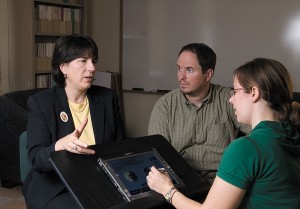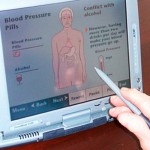
Before tablet computers were on the market, Patricia Neafsey envisioned a user-friendly software program for older adults to learn more about their medications and potentially dangerous drug interactions.
Neafsey, a professor of nursing and a principal investigator at UConn’s Center for Health, Intervention, and Prevention, began by developing the program for individuals with hypertension.
“Patients with hypertension are an important population to study because they will have to take medication the rest of their lives,” she says. “If this kind of intervention is going to work, it should work with this population and this kind of chronic disease.”
For a study of the initial version of her software, Neafsey attached touch screens to laptop computers with Velcro.
Older adults with hypertension completed paper-and-pencil surveys about their medication use, and then used the modified laptops to view a series of animations about blood pressure medicines and drugs that could interact with them.
With the help of a $1 million grant from the National Institutes of Health, Neafsey’s software has evolved to match her original vision.
She now is testing her “Personalized Education Program-Next Generation” through a clinical trial involving 264 patients with hypertension age 60 and over at 11 primary care practices across Connecticut.
She says more than 90 percent of adults age 65 or older take at least one medication daily, and almost 60 percent of adults in that age group take five or more medications daily, including over-the-counter medicines and herbal supplements.
“Many of these agents can interfere with antihypertensive medications,” says Neafsey, who has a doctorate in pharmacology.
Many patients do not know, for example, that ibuprofen actually elevates blood pressure on its own, and also counteracts the effectiveness of antihypertensive medications, she adds.

The program, which contains more than 1,600 ingredients and 183 adverse self-medication behaviors in its database, runs on a touch screen tablet computer that patients can use while waiting in doctors’ offices for routine medical appointments.
Each patient answers questions about his or her medications on the touch screen. The program then ranks the medication behaviors by degree of risk, and delivers tailored, interactive educational content about them.
It also provides the patient’s doctor or nurse practitioner with a summary before they see the patient, so they can discuss the issues during the office visit.
A team of UConn researchers helped develop the program, including co-investigator Carolyn Lin, a communications sciences professor, Elizabeth Anderson, an associate professor of nursing, and Sheri Peabody, a graduate student in nursing.


